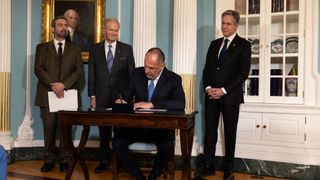
From left: Ioannis Daglis, president of the Hellenic Space Center, NASA Administrator Bill Nelson, and U.S. Secretary of State Antony Blinken watch as Giorgos Gerapetritis, Greek foreign minister, signs the Artemis Accords on the margins of the U.S.-Greece Strategic Dialogue at the Department of State in Washington, Feb. 9, 2024.
(Image credit: Official State Department photo by Chuck Kennedy)
Greece is the latest country to sign up to the United States’ club for guiding principles of space exploration.
Greece’s foreign minister, Giorgos Gerapetritis, signed the Artemis Accords on behalf of his country at the U.S. State Department on Feb. 9, during a wider U.S.-Greece Strategic Dialogue meeting.
“Congratulations to Greece on becoming the 35th country to join the Artemis Accords family,” NASA Administrator Bill Nelson said at the ceremony, according to a NASA statement.
“The U.S. and Greece are long-time partners and friends, and we are excited to expand this partnership in the cosmos,” Nelson added. “Together, we are shaping the future of cooperation in space for the Artemis Generation.”
Related: What are the Artemis Accords?
The Accords set out principles for peaceful and responsible exploration, most immediately guiding NASA’s lunar Artemis program.
“As humanity embarks on a great adventure, returning to the moon and preparing for traveling beyond the moon, the Artemis Accords serve as a beacon of collaboration and cooperation among nations, paving the way for a sustainable and peaceful exploration of space,” Gerapetritis said in the same statement.
The United States established the Artemis Accords in 2020. They were first signed by the United States along with seven other original signatories. The band of countries has now expanded to include nations from six of the world’s seven continents, with only Antarctica — which does not have a government — not represented.
The Artemis Accords initiative has an apparent alternative and potential competitor, in the form of the China-led International Lunar Research Station Cooperation Organization (ILRSCO). So far Azerbaijan, Belarus, Egypt, Pakistan, Russia, South Africa and Venezuela have joined up with that effort.
ILRSCO will coordinate and manage how these countries go about establishing the International Lunar Research Station (ILRS) in the 2030s.
The Artemis Accords builds upon the principles set out by the 1967 Outer Space Treaty, according to NASA, and strengthens best practices such as the public release of scientific data.
Major signatories include Canada, France, Germany, India, Italy, Japan, South Korea, Saudi Arabia, Spain and the United Kingdom.
Join our Space Forums to keep talking space on the latest missions, night sky and more! And if you have a news tip, correction or comment, let us know at: [email protected].
Breaking space news, the latest updates on rocket launches, skywatching events and more!
Andrew is a freelance space journalist with a focus on reporting on China’s rapidly growing space sector. He began writing for Space.com in 2019 and writes for SpaceNews, IEEE Spectrum, National Geographic, Sky & Telescope, New Scientist and others. Andrew first caught the space bug when, as a youngster, he saw Voyager images of other worlds in our solar system for the first time. Away from space, Andrew enjoys trail running in the forests of Finland. You can follow him on Twitter @AJ_FI.
>>> Read full article>>>
Copyright for syndicated content belongs to the linked Source : Space.com – https://www.space.com/greece-signs-artemis-accords-nasa-moon-exploration










